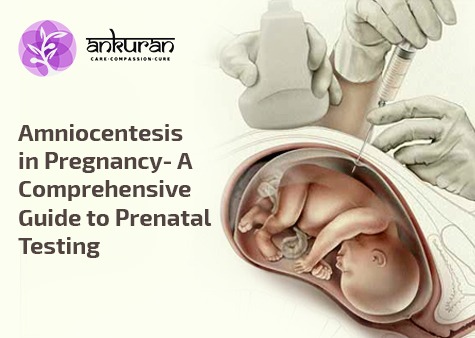Prenatal testing is crucial. It ensures a healthy pregnancy. One such test is an amniocentesis test. It’s a key prenatal test. This test acts as a powerful lens, revealing invaluable details about your baby’s health. We’ll delve into the importance of amniocentesis in this article.
You can learn crucial information about your baby’s health through amniocentesis. It’s crucial to be aware of the potential risks associated with amniocentesis and to be ready for the test results. The test may be done around week 15 to 20 of pregnancy. It can show if certain genetic conditions are present in the fetus.
Why is an Amniocentesis Test Performed?
An Amniocentesis test is performed for several reasons. It’s a prenatal test that diagnoses certain congenital disorders during pregnancy. It’s possible to perform the procedure after or simultaneously with a detailed fetal anomaly scan. It is used to diagnose conditions such as Down syndrome, cystic fibrosis and many more congenital disorders. If you’re older than 35 at the time of delivery, your baby has a higher risk of having chromosomal conditions.
Amniocentesis can rule out these conditions. If you or your partner is a known carrier of a genetic disorder, amniocentesis can detect whether your unborn child has this disorder. In addition, it can be used to assess the development of fetal lungs.
The Procedure of Amniocentesis: Process and Purpose
The primary objective of amniocentesis is to conduct a detailed analysis of the baby’s health, concentrating on genetic and chromosomal aspects. Here’s how it’s performed:
- The patient lies down on an examination table. This is to ensure comfort during the procedure.
- Checking vital signs such as heart rate and blood pressure are done. In this way, the patient’s stability is ensured.
- An ultrasound scans the fetus. This helps locate the baby and the amniotic sac.
- During the procedure, the abdomen is cleaned with antiseptic. This is to prevent infection.
- A thin needle is inserted through the abdomen to collect amniotic fluid. The needle does not harm the baby.
- The collected fluid is sent for examination. It’s tested for genetic conditions and infections.
Before the test, it’s recommended to drink plenty of fluids. This helps increase amniotic fluid levels, making it easier for the ultrasound to guide the needle. There are no specific dietary constraints prior to the test. You are free to consume food and beverages as you typically would.
Risks and Complications: Potential Downsides of Amniocentesis Test
Amniocentesis carries some risks. These include:
- Cramping:
A few women might encounter cramping either during the procedure or in the aftermath.
- Bleeding or Leaking:
There’s a risk of minor spotting or leaking of amniotic fluid.
- Infection:
While the occurrence is rare, there is a potential for infection to develop.
- Miscarriage:
The most significant risk is miscarriage. The likelihood of a miscarriage occurring due to the procedure is approximately 1 in 900. A review of literature suggests that the risk of miscarriage within the procedure was 0.1% to 0.3%. However, there is a higher risk if the procedure is done before the 15-week mark in a pregnancy.
Understanding Amniocentesis Results
Amniocentesis results are interpreted in a lab. Normal results mean it’s unlikely your baby has the tested disorders. Abnormal results indicate the presence of a condition. After receiving the results, you have options such as choosing to continue the pregnancy or preparing for any extra needs. Alternatively, if you want to, you may consider ending the pregnancy.
It is important for the Amniocentesis timing to be correct. The amniocentesis procedure is usually performed between the 15th and 20th weeks of pregnancy. It can be done later if necessary. However, doing it before the 14th week of pregnancy might lead to more complications.
Specialists can provide detailed information about the condition to help you decide. It’s important to understand that abnormal results don’t automatically mean your baby has the condition, and that further testing may be needed to confirm the diagnosis. It’s also important to talk to a healthcare professional about the results so that they can provide the most accurate information and advice.
Why is Ankuran Clinic the Best Place for an Amniocentesis Procedure?
Ankuran Clinic is a top fertility clinic in Salt Lake, Kolkata. It offers a comprehensive range of assisted reproductive techniques. The clinic is known for its care, compassion, and cure. They have earned praise and high ratings from their patients.
For these reasons, Ankuran Clinic is an excellent choice for an amniocentesis procedure and many female fertility tests. The clinic has a proven track record of successful treatments. The staff are highly knowledgeable and experienced. The clinic is also well-equipped with the latest technology and facilities. Moreover, the amniocentesis test cost is quite reasonable.
FAQ
If you are looking for answers to common questions and concerns about amniocentesis then here is a short list of frequently asked questions that can give you valuable insight on the procedure.
What Diseases Can Be Detected by An Amniocentesis Procedure?
Amniocentesis can detect a variety of genetic disorders and congenital disabilities. Down syndrome, Tay-Sachs disease, cystic fibrosis, and neural tube defects such as spina bifida or anencephaly are some of these conditions.
What Is the Cost of An Amniocentesis Test?
The cost of an amniocentesis test varies depending on the location and whether you have insurance. In India, the cost starts from ₹ 14,250 and can go up to ₹ 38,500. It’s best to check with your insurance company or healthcare provider for the most accurate information.
Is The Amniocentesis Painful?
Amniocentesis is typically not painful. Nevertheless, a few women might encounter slight discomfort or cramping either during or following the procedure.
What To Do After Amniocentesis?
After an amniocentesis, it’s recommended to rest at home and avoid strenuous activities for at least 24 hours. If you have severe abdominal pain, fever, or vaginal bleeding or leaking of amniotic fluid, get in touch with your healthcare provider right away.
Conclusion
Amniocentesis is a vital prenatal test. It provides crucial information about your baby’s health. This includes potential genetic disorders and chromosomal abnormalities. Nonetheless, it’s vital to talk to your healthcare provider about this.
They can provide guidance by considering your situation and specific needs. Keep in mind that each pregnancy is unique, and what’s effective for one may not be suitable for another. So, always consult with your healthcare provider for the best advice.



No Comments